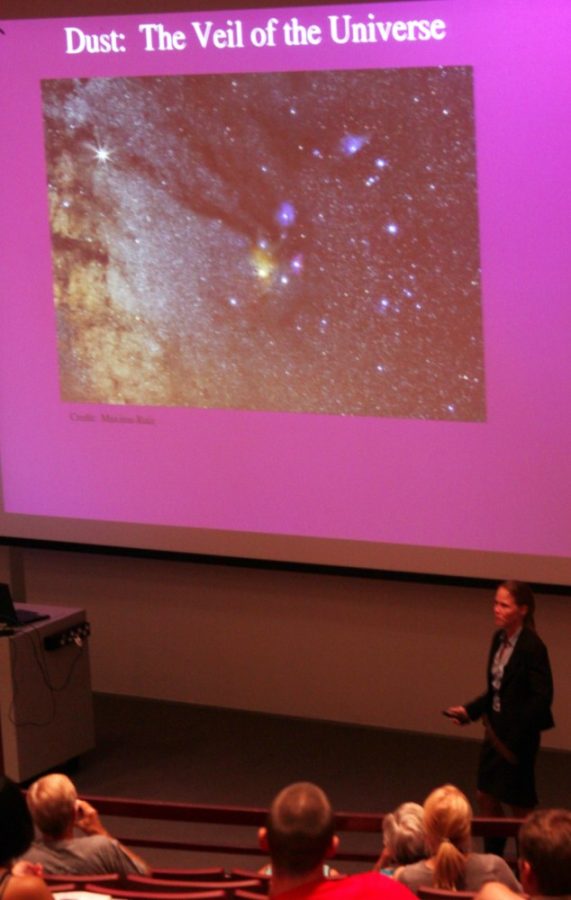Triangulum galaxies. Shooting stars. The birth of supernovas. Cracking Einstein’s Code. These topics and more will be revealed to lecture-goers in the semester-long speaker series at Steward Observatory.
A lecture last night, “”A Study in Scarlet: The Spitzer Space Telescope View of the Triangulum Galaxy,”” was presented by Dr. Joannah Hinz, senior research assistant in the infrared astronomy wing. The lecture focused on the Triangulum Galaxy, one of three spiral galaxies in our local galaxy group.
The program, its directors say, aims to give everyone from old and seasoned astronomers to young and eager students with their first telescopes, a view of the universe’s expanse. Steward Observatory has been hosting public, evening lectures on astronomy since 1922.
Seven free lectures are scheduled for the fall semester, and all are held on every other Monday at 7:30 p.m. in Room N210 of the Steward Observatory.
Following each lecture, the Raymond E. White Jr. Reflector in the historic Steward Observatory dome will be open for the public to view the night sky. Steward Observatory is paid for with taxpayer money and the lecture series is one way in which astronomers can give back to the public by sharing the exciting research they conduct, said Thomas Fleming, associate astronomer and senior lecturer at the observatory.
“”You really have no idea how big the universe is,”” he said. “”If you don’t look to the stars, you’re ignoring 99.9999 percent of the universe. Every other department deals with what happens on this planet, we have the whole rest of the universe.””
Hinz began her lecture loosly quoting passage from the Sherlock Holmes’ novel, “”A Study in Scarlet””: “”There’s a scarlet thread of murder running through the colorless skein of life, and our duty is to unravel it, to isolate it, and to expose every inch of it.””
“”Except for the murder,”” she said, “”that’s how I feel about science.””
Jamie Fitzgerald, a freshman business major, and Amy Ciaccio, a freshman psychology major, attended the lecture for their natural sciences 101 class, Planet Earth: Evolution of the Habitable World class. They said their professor, Dr. Hal Larson, invited his students to interact with the science community on campus.
“”He tells us to talk to rocks and stuff,”” Fitzgerald said. “”It’s really cool, looking at systems and energy and understanding even why people work they way they do from the science spectrum.””
All those who attended the lecture were able to look through the White Reflector telescope afterward. A few astronomy majors helped position the telescope on Jupiter and its four moons.
“”I like being right,”” Pye pye Zaw, a sophomore astronomy and physics major said about why she choose to study the stars. “”It’s easy to be right in a field where no one knows the right answer … Also, I really like shiny things.””
Ciaccio said, as she went up to look through the telescope lens, that learning about the stars makes her feel small.
“”It’s scary and fascinating at the same time,”” she said.
Former UA professor Andrew Douglass established Steward Observatory in 1916 and made sure the public was invited to view the night skies. Efforts by UA astronomers to engender enthusiasm among the public go back to the times when Douglass would hold lectures under the stars in the uncompleted construction site, Fleming said.
The Spitzer Space Telescope is an infrared telescope that orbits in space behind Earth because it observes the galaxy with long infrared wavelengths that can’t make it back to Earth before being absorbed by our atmosphere. Since it is in space, it can see objects in other galaxies much clearer than they can be observed from optical telescopes on Earth, Fleming said.
This year is the United Nations International Year of Astronomy in memory of Galileo Galilei, who created the first telescope 400 years ago. Kitt Peak has been selling “”Galileo scopes”” for $12 and the UA has bought 400. General education students in the astronomy department will use these kits to build their own telescopes with which to view the heavens. Fleming said the ‘Galileo scopes’ are actually much better than Galileo’s own telescope.
“”While you’re here in college,”” Fleming said, “”you’re here to expand your mind. What better way to do that than contemplate the expanse of the universe?””









